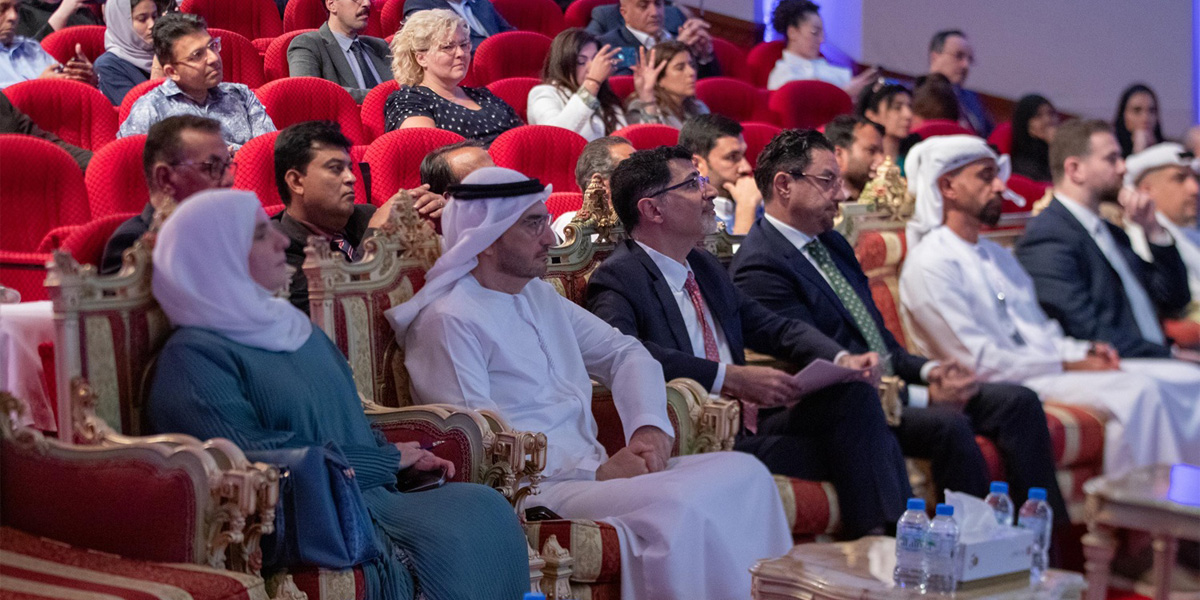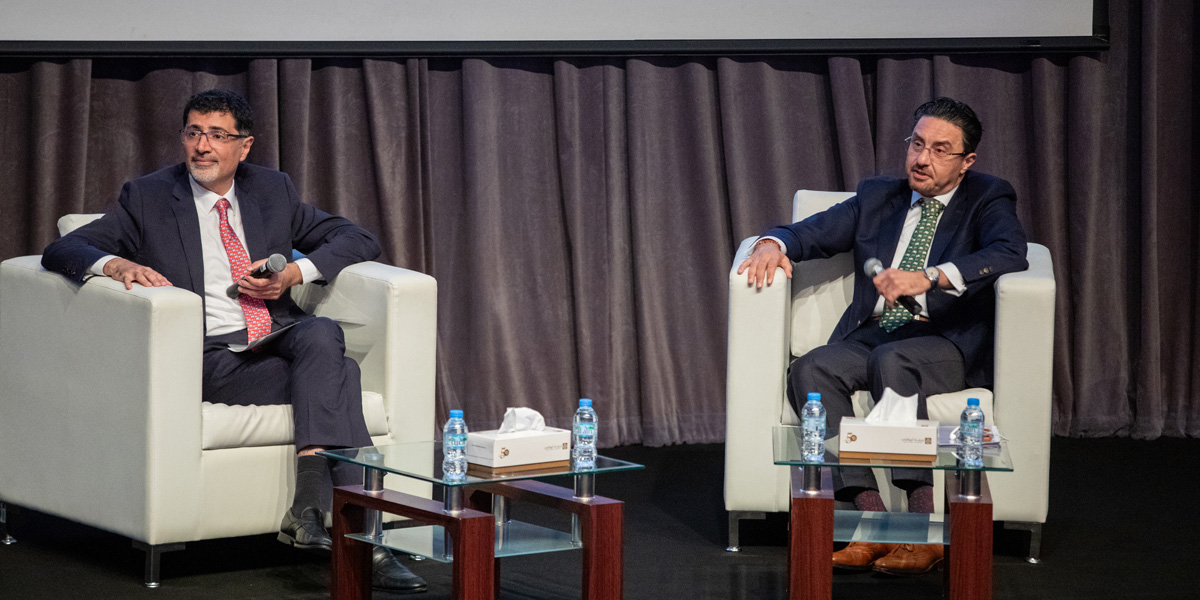The workshop aimed to raise the business community’s awareness about local regulations and legislation
The Abu Dhabi Chamber of Commerce and Industry (ADCCI) organized a workshop to raise awareness of Federal Decree-Law No. 14 of 2023 Concerning Modern Technology-based Trade.
This workshop is part of the Chamber’s efforts to enhance the local business community’s awareness and familiarity with the most prominent recent legal changes and developments related to the commercial sector and the regulation of the business ecosystem in the UAE.
The workshop, organized by the Chamber’s Data and Economic Studies Department in cooperation with the Ministry of Economy at the ADCCI headquarters, featured Hassan Riyad Al Kilani, Legal Advisor at the Office of the Undersecretary of the Ministry of Economy. It also included representatives of the sectoral working groups operating under it, as well as the heads and owners of several private companies operating in the commerce sector and other economic fields.
The workshop revealed that the number of eCommerce companies registered with the ADCCI has increased by about 12% between 2022 and 2023.
His Excellency Ahmed Khalifa Al Qubaisi, CEO of ADCCI, said, “This workshop is one in a series that the Chamber intends to organize in the future to raise awareness among the private sector about new federal and local laws that directly and indirectly affect the business community. This is based on the Chamber’s firm belief in the necessity of providing entrepreneurs and businessmen in the Emirate with the tools and knowledge required to move flexibly and effectively in the world of eCommerce and digital trade. This leads to the advancement of the knowledge and innovation based economy in the UAE and Abu Dhabi, achieving sustainable growth.”
“This workshop is vital in terms of highlighting the importance of the new eCommerce law and its influential role in shaping the promising future of the UAE’s economy. It enhances the dynamism of the local business community, which forms the backbone of the national economy, and increases its ability to take prosperity in our country to greater progress and prosperity. This will be achieved by stimulating the growth of trade through advanced technologies, which attracts more investments to the UAE and contributes to strengthening its leading position as a global hub for business and trade,” Al Qubaisi added.
The workshop also contributed to raising awareness among participants and attendees about the most important eCommerce and digital trade laws issued in the UAE recently. These laws support trade activities and the most important changes that support growth, the most prominent of which is the Federal Decree-Law No. 14 of 2023 Concerning Modern Technology-based Trade, which aligns with the UAE’s strategic adoption of digital transformation.
Hassan Riyad Al Kilani, Legal Advisor at the Office of the Undersecretary of the Ministry of Economy, discussed the importance of the new law in raising the UAE’s ranking in global economic competitiveness indicators such as the Global Competitiveness Report and the Ease of Doing Business Report. He emphasized its role in accelerating the digital transformation in the economy and enhancing the UAE’s position as a hub for business activities in the field of modern technology. He stressed the need for companies to adopt modern technological trade methods and adhere to applicable laws and regulations, enabling them to achieve more growth and expand their reach locally and internationally.
He pointed out that the law foresees the future and is not limited to current commercial operations provided by specific technical means such as electronic or digital means, Blockchain, or others; rather, it covers all current and future modern technologies used for sales or purchases of goods through various means.
Al Kilani reviewed the most prominent outcomes of Law No. 14 of 2023 regarding technology-based trade. These include achieving the UAE’s strategic goals in the field of digital transformation and strengthening the legislative and regulatory framework for commercial operations using modern technical means. Additionally, it involves attracting more investments and skills, stimulating business, and providing goods and services using these technologies, among many other beneficial outcomes.
“The law also contributed to achieving integration of roles between the federal and local authorities concerned with modern technology-based trade. It provides flexible legislation to enable these authorities to exercise their powers and achieve compliance with the requirements simultaneously. This starts with the requirements of the Central Bank regarding digital payment gateways, the Federal Tax Authority, and the Telecommunications and Digital Government Regulatory Authority (TDRA), as well as the requirements of the federal and local authorities regarding cybersecurity. It extends to the necessary approvals from the local authorities concerned with the digital transformation of commercial activities and the requirements of the economic development departments that license commercial activity and individuals who practice technology-based trade,” he added, noting that the law did not introduce any additional requirements, licenses, or approvals; rather, it aims to fulfill the existing ones issued by the authorities to ensure the safety of doing business.
Al Kilani said, “The law sets the necessary frameworks in the field of technology-based trade, whether it’s eCommerce or digital trade, or other means. It ensures the necessity of regulating the relationship between contracting parties and protecting the consumer and concerned parties based on technical developments and the communications revolution. This contributes to increasing the effectiveness of trade through modern means of communication, the UAE’s infrastructure, and the logistics and transportation sectors.”
Aref Alfarra, economic advisor at the Abu Dhabi Chamber, highlighted during the workshop the importance of the new law in supporting the readiness of the UAE’s economic legislative structure to receive more national and foreign direct investments. It aims to achieve diversification in providing commercial activities, ensure the provision of the best services to businessmen and consumers, provide more job opportunities in the country, and keep up with advanced technology trends.
He pointed out that the eCommerce market is witnessing a rise in the Middle East and North Africa (MENA) region and is expected to reach about USD 57 billion by 2026. Additionally, there are expectations of an increase in the contribution of eCommerce to the total retail trade in the region from 5.7% in 2022 to 8.3% in 2026, noting that the UAE ranked third in terms of the total volume of eCommerce in the MENA region in 2022.
Alfarra noted that China has emerged as the largest eCommerce market in the world, with its total electronic sales exceeding USD 3 trillion last year. He mentioned that many commercial sectors in the UAE are achieving rapid growth in the eCommerce sector, thanks to the development of digital financial technologies in recent years.
Alfarra explained many factors that are considered a fundamental pillar in strengthening the UAE’s position in e-commerce. These include the distinguished geographical location, the development of cybersecurity systems, the competitive environment for the business sector, and the availability of an advanced infrastructure for financial technologies. He also highlighted that these factors make the country a major destination for global e-commerce companies.
SOURCE

© 2024 Abu Dhabi Chamber







